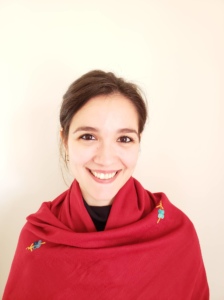News
Meet the Fellows: 2019 Newcombe Fellow Nadia Sariahmed-Belhadj

The Charlotte W. Newcombe Doctoral Dissertation Fellowship is the nation’s largest and most prestigious award for Ph.D. candidates in the humanities and social sciences addressing questions of ethical and religious values. The 2019 class of Fellows includes Nadia Sariahmed-Belhadj, a doctoral candidate in Middle Eastern, South Asian, and African studies at Columbia University. Nadia shares some of the inspiration for her dissertation research:
I’ve seen Gillo Pontecorvo’s 1966 film The Battle of Algiers lots of times: on a VCR recording with my grandma, parents, and siblings (when I was probably too young to be watching it); on Algerian state-run television on summer vacations in Algiers; and as a freshman at Columbia University in a course called “Contemporary Islamic Civilization.” I’ve even taught the film for two different classes as a teaching assistant at Columbia. The film ends with the mass demonstrations for independence in Algiers in December 1960, three years after the French army’s brutal defeat of Algerian freedom fighters in the city. These popular demonstrations marked a decisive turning point in the revolution, and paved the way for independence. When the liberation struggle seemed to be lost, the people intervened to deliver a decisive victory. Yet the film, like most histories of the revolution, silences these women and men, even as it pays homage to them.
As its title suggests, my dissertation is inspired by the story told in Pontecorvo’s film, even as it offers a critique of it. I have tried to offer a more plural account of the revolution, learning from the perspectives of people who participated in it. Unlike most histories of the revolution, I have not sought more objective facts about what “really” happened by searching through official documents. I have instead tried to illuminate the truths to be found in the stories of those who have left few traces of their revolutionary experiences. There are many women and men like Ali La Pointe whose names are not known (including women like Hassiba Ben Bouali, who is featured in Pontecorvo’s film without being named), but who carved the path to independence. In interviewing women and men who participated in the Algerian revolution, I have not only sought to shed a different light on this particular period of history. I have also taken the political visions, values, and practices of the people with whom I spoke as a legitimate vantage point from which to reflect on questions that are pertinent to ongoing struggles for freedom.
Nadia’s dissertation, titled The Battles of Algiers: popular politics of the Algerian Revolution, examines the political goals, practices, and norms of the popular struggle for national liberation in Algiers, from the perspective of Algerians who participated in it. For more information on the 2019 Newcombe Fellows, click here.

